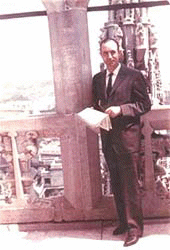The Newspaper Journalist |
|

|
1971: El hombre y su medio y otros ensayos 1986: Ventana al mundo 1994: Mariposas y supercuerdas: Diccionario para nuestro tiempo |
The Newspaper Journalist |
|

|
1971: El hombre y su medio y otros ensayos 1986: Ventana al mundo 1994: Mariposas y supercuerdas: Diccionario para nuestro tiempo |
|
Most of the shorter essays presented in these books were originally published in newspapers. On looking at the title of the first book one might then believe that it should be placed in the section entitled The Essayist. In the Preliminary Note, however, Ferrater asserts that what is contained in this book is, "a series of articles—or article-essays," that were published in La Vanguardia, a Barcelona newspaper. In speaking of "article-essays" Ferrater breaks down the usual distinction between articles and essays, showing us once again that his work does not easily fit into traditional categories. Ferrater admits that when he considered the publication of these article-essays in newspapers, he tried to be as lively, amusing and diversified as a philosopher can be, but when he contemplated their collection in a book, he tried to be as rigorous, analytical and rational as a journalist could be. He then continues that it is not easy to combine these characteristics, but if it can be done, there is no reason to reject the opportunity. It is not necessary, he says, for journalism to be philosophical all the time, but a little philosophy does no harm and might even do some good, at least for philosophy itself which has gone from having a bad press to having practically none, which is unfair, although many philosophers are themselves to blame since they have confused the austerity of philosophy with academic pedantry. It is a shame, he adds, because philosophy has many ways of revealing the world. Ferrater Mora liked writing for the papers for he believed that the people who read his newspaper articles were not necessarily the same ones who read his books. For this reason, he thought that writing for the papers increased the number of his readers. Many of his newspaper articles, published in both Spain and Argentina, were, as he foresaw, later collected and published as books. In the Preface to Mariposas y supercuerdas, Ferrater Mora explains that he described an earlier collection of essays published as Ventana al mundo as a “Dictionary for Our Time” because the articles were ordered alphabetically and thematically. It was, he says, a way of viewing the variety of the world. In Mariposas y supercuerdas he continues the same approach of categorizing his essays into a number of themes that are then alphabetically ordered. If one asks about the subject matter of these essays, the answer is simple: our world. This answer, however, does not tell us very much or, to be more precise, tells us too much. |